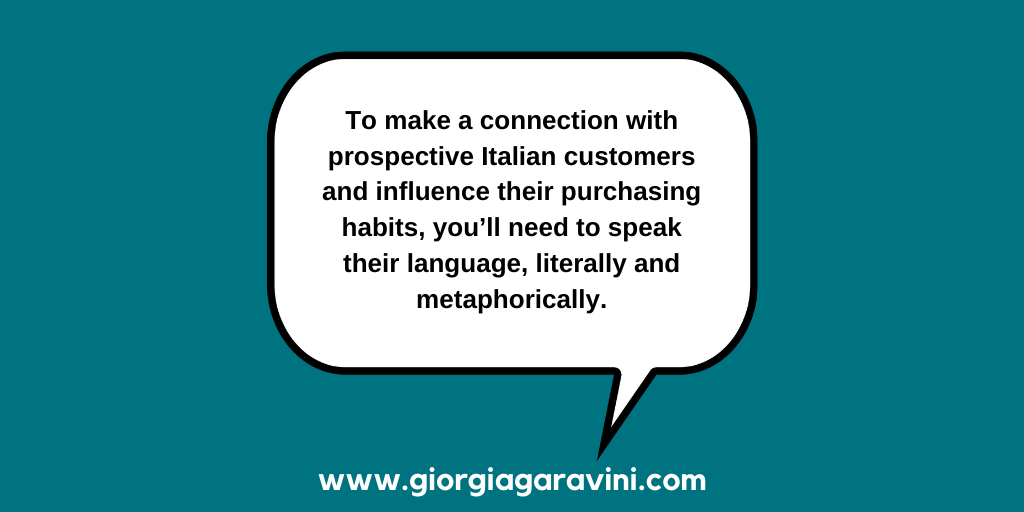Planning to expand your business into Italy or sell your products or services to an Italian market?
You may be wondering about the way of doing business in Italy and if it’s compatible with, or similar to, UK business culture.
You may be wondering about the way of doing business in Italy and if it’s compatible with, or similar to, UK business culture.
Stereotypes about the differences between Italy and the UK can be off-putting. Like the idea that Italians care a lot about appearance or that Italy is more traditional and risk-averse than the UK. But these are generalisations and should be taken with a pinch of salt.
The way of doing business in the UK and Italy is actually more similar than you might think.
Here’s why:
The way of doing business in the UK and Italy is actually more similar than you might think.
Here’s why:
Rich economies
Although there may be political instability in both countries, Italy and the UK have advanced economies, are well developed and have modern infrastructures. They’re both in the top 10 richest economies in the world.
Italy ranks 17th out of 50 in Commisceo Global’s list of the easiest economies to do business in, not far from the UK which comes in at number 10.
This suggests both countries have relatively simple cultures for businesses to grow in.
Italy ranks 17th out of 50 in Commisceo Global’s list of the easiest economies to do business in, not far from the UK which comes in at number 10.
This suggests both countries have relatively simple cultures for businesses to grow in.
Location and time zones
It’s quite easy to get to Italy from many UK airports and the time difference is only an hour ahead of the UK, so business hours are similar.
This means distances and time zones shouldn’t impede your ability to trade with Italy, speak to Italian clients or attend important meetings.
This means distances and time zones shouldn’t impede your ability to trade with Italy, speak to Italian clients or attend important meetings.
Value systems
According to Hofstede Insights, a website that compares countries and their cultures, the value systems in Italy and the UK are similar. Both countries score closely on how ‘masculine’ they are, meaning they’re ‘highly success oriented and driven’. Hofstede Insights indicates that competition and achievement drive both societies and can instil these values into students from an early age.
This suggests ideas about success are similar in both countries, which should make growing your business and making business connections easier. But bear in mind that these comparison scores may not necessarily be true of every part of Italy and everybody in Italy.
This suggests ideas about success are similar in both countries, which should make growing your business and making business connections easier. But bear in mind that these comparison scores may not necessarily be true of every part of Italy and everybody in Italy.
Business etiquette
Many clichés crop up around business etiquette in Italy. Some common ideas include that your business will be judged by your appearance, that the North is more direct than the South and that Italians prefer doing business with people they know. Whilst clichés usually have an element of truth to them, it doesn’t mean to say this is definitely the experience you’ll have when selling your products or services in Italy.
The key to business success
Ultimately the key to successfully marketing your business in Italy is the same as it is in the UK.
The way you conduct yourself, whether you turn up to meetings on time and what you wear may play some part in your success (just as it would in the UK). But it all comes down to having good business ideas, your USP, if there’s a market for your products or services and how well you communicate with your customers.
The way you conduct yourself, whether you turn up to meetings on time and what you wear may play some part in your success (just as it would in the UK). But it all comes down to having good business ideas, your USP, if there’s a market for your products or services and how well you communicate with your customers.
So how do you communicate well with Italian customers?
Don’t focus on perceived cultural differences or stereotypes. Instead, do your own research into your target audience, finding out the problems they have and what makes them tick. Then, in your marketing materials, show them how your products and services will make their lives easier.
To make a connection with prospective Italian customers and influence their purchasing habits, you’ll need to speak their language, literally and metaphorically.
Using the same words and phrases your target market uses is a good place to start. To do this effectively, you’ll need to ask a professional Italian translator to translate your marketing materials, product information and business cards into Italian. A professional translator will convert your information into the local dialect and help you avoid any potential cultural stumbling blocks.
By translating your business and marketing information, you’re showing prospective customers you care about them. And respecting your customers is a huge part of successful business relationships, wherever you are in the world!
Want to know more about doing business in Italy? Check out my blog post on Italy’s consumer market.
To make a connection with prospective Italian customers and influence their purchasing habits, you’ll need to speak their language, literally and metaphorically.
Using the same words and phrases your target market uses is a good place to start. To do this effectively, you’ll need to ask a professional Italian translator to translate your marketing materials, product information and business cards into Italian. A professional translator will convert your information into the local dialect and help you avoid any potential cultural stumbling blocks.
By translating your business and marketing information, you’re showing prospective customers you care about them. And respecting your customers is a huge part of successful business relationships, wherever you are in the world!
Want to know more about doing business in Italy? Check out my blog post on Italy’s consumer market.

